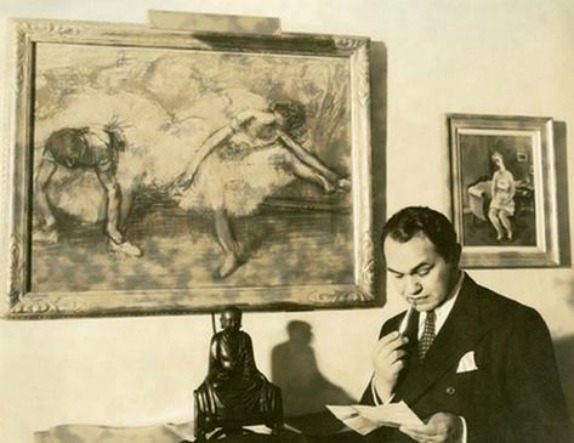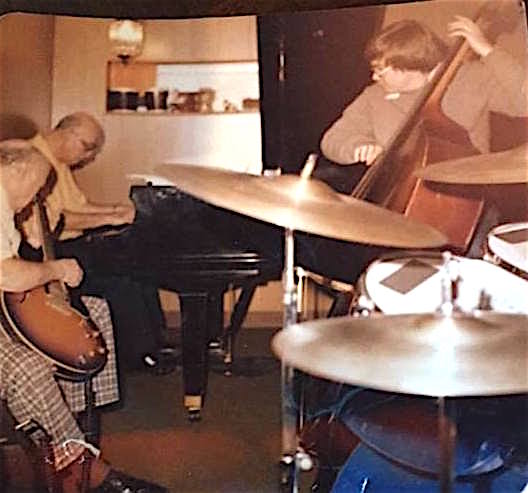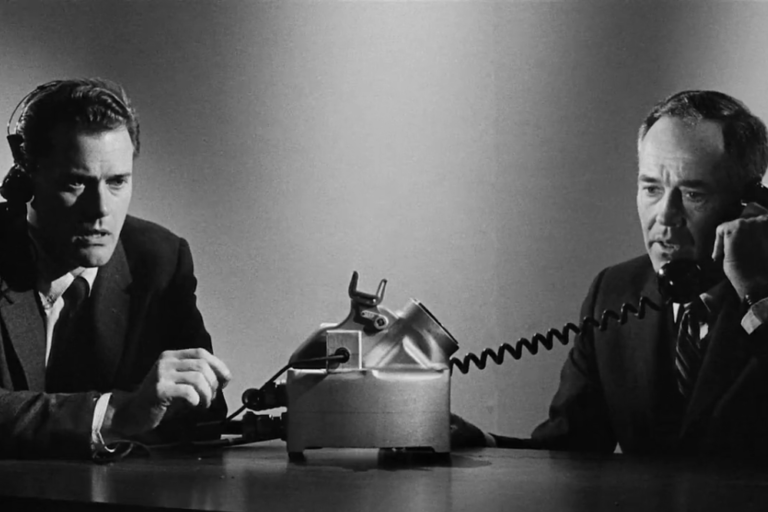It was also misleading—deliberately so. That has also been our custom.
No more. Mrs. T, who is a very private person (that’s why I refer to her as “Mrs. T” in this space) and thus has been reluctant to be entirely frank about her illness in public, decided last night that it is time at last for me to start writing with complete candor about the increasingly desperate state of her health.
So…here goes.

To begin with, her condition has been declining steadily for the past couple of years, and that decline picked up speed a few months ago. She is much sicker now than when I first wrote about her need for a transplant in 2017. Except for doctor visits, she’s been housebound since late summer—she spends virtually all of her time in bed or on the living-room couch—and her vital signs have gradually sunk to the low side of what for her long ago became “normal.”
On Saturday evening, her blood oxygen saturation level, the statistic that is the most critical indicator of her minute-to-minute condition, became alarmingly unstable, then plummeted downward, from 75% to 40%. (One hundred percent is normal.) We knew this to be a possible sign that the right ventricle of her heart was starting to decompensate and fail—something that typically happens sooner or later to patients in the end stage of primary pulmonary hypertension, the rare and fatal illness from which Mrs. T suffers. Our standing instructions are to call 911 should her sat level suddenly drop by a significant amount and fail to rebound. We did so, and an ambulance arrived within minutes and rushed us to the emergency room of New York-Presbyterian Hospital, a mile from our front door.
Twenty-four nerve-racking hours later, Mrs. T was transferred to the intensive-care unit around the corner, where the doctors were unable to bring her blood oxygen up to a safe level. For this reason, they decided to hook her up to an ECMO machine, a new kind of heart-lung machine that continuously oxygenates a patient’s blood supply.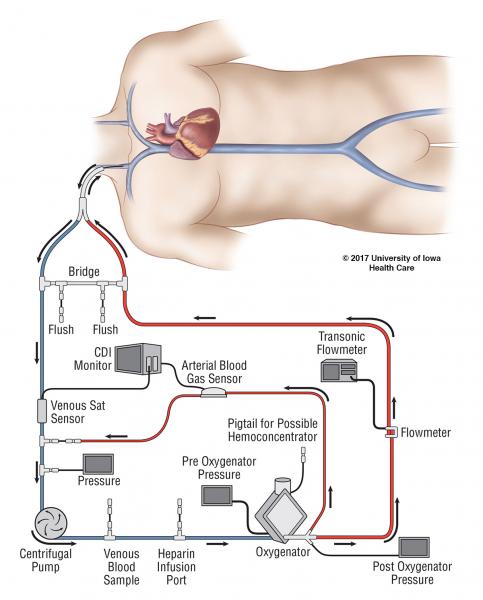
What I didn’t tell you on Monday is that the use of an ECMO machine is a last-resort measure. Moreover, the ICU doctors were far from certain that it would solve her problem. In fact, they warned me—not in so many words but straightforwardly, which was what I wanted—that there was a good chance she was about to die.
As I sat in the corridor waiting for the machine to be connected to her body, I recalled a pair of numbers that everyone who needs a transplant knows by heart:
• As of this hour, 113,000 Americans are waiting for a transplant that could save their lives.
• Roughly twenty of them will die waiting today, and another twenty tomorrow and the day after that, because of a chronic shortage of donor organs nationwide.
I thought: Is the woman I love about to become one of those people?
Then one of the doctors came out to me, smiled broadly, and said, “It’s working. The machine is hooked up. Her oxygen level is 100%.”
No sooner did he speak those words than my stomach heaved, and I came close to vomiting on the floor. Then I started crying.
It is not even remotely true to say that Mrs. T is out of danger. Her doctors believe that she will probably have to remain in the ICU, hooked up to an ECMO machine, until a compatible pair of donor lungs finally becomes available—or until her body wears out and she dies, which will happen sooner or later.
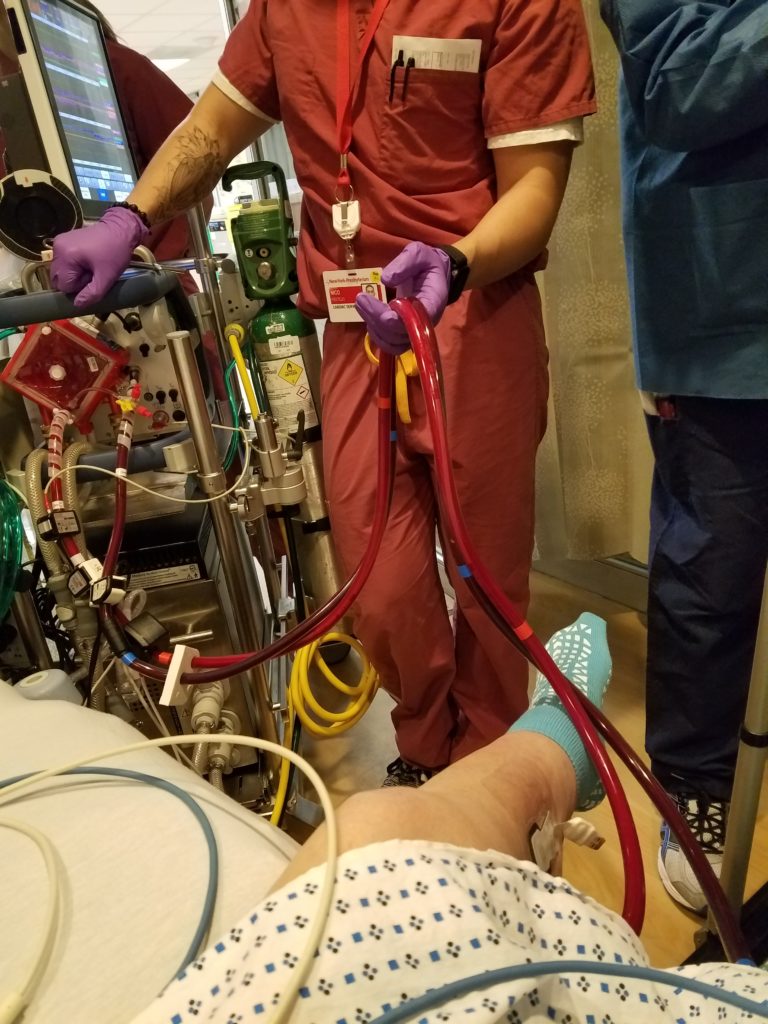
Meanwhile, she is waiting as patiently as she can, suffering as she does so (as has been the case for several years) from nonstop, at times excruciating pain that can only be eased with opiates, relieving herself through a Foley catheter because she is too fragile to use a urinal or a bedside commode, unable to do much of anything but read, watch movies, play electronic solitaire, and post the odd message on Facebook.
I spend several hours sitting with her each day, though there isn’t much room to spare in her tiny cubicle, most of which is now occupied by the half-dozen units that comprise the complicated machine that is keeping her alive. (At right is a snapshot taken by Mrs. T that shows part of the ECMO machine at work. That’s her blood flowing through the red hose.)
I’ve said it before, but I can’t possibly say it often enough: Mrs. T is tougher and more gallant than anyone I know. She’s not going down without a fight. But she’s been fighting for a long, long time, and she’s tired. It’s true that she’s been moved to the very top of New York-Presbyterian’s lung-transplant priority list as a result of her being put on the ECMO machine. Unfortunately, it’s far from a sure thing that she’ll receive a compatible pair of donor lungs in time to keep her alive. In the six months since the New York-Presbyterian transplant team told her that she was sick enough to start receiving organ offers, we’ve gotten only two Big Calls, both of them dry runs that didn’t pan out.The rest—so far—is silence.
* * *
You now know exactly what’s up with us. The bark, as they say, is off. Yes, we’re coping as best as we can, and we’ll continue to do so. There’s nothing the two of us love more than being together, and there’s nothing we want more than to be able to return to our beloved Sanibel Island, walk on the beach hand in hand, and listen to the soothing sound of the surf. We’re tired of keeping our cellphones turned on 24/7 in the hope of getting a Big Call that will change our lives. We’re tired of pain and fear and middle-of-the-night crises. We’re ready for a change.

We also know—really, really know—that in order for these things to end, an unknown person of short stature with two good lungs and A-positive-compatible blood will have to die, sooner rather than later.
That is a terrible fact with which to live day in and day out, at least as terrible as Mrs. T’s grueling everyday suffering. Yet it is something both of us have learned, however reluctantly, to accept. It is the plain truth about organ donation, a cruel truth—and a beautiful one.
To all of you out there who have sent us your good wishes in recent weeks, we bless you for them. Your messages are among the few things that can put a smile on her weary face when she’s having one of her bad days. But please permit me to ask you for one more thing: if you haven’t signed up to be an organ donor, do it now.
Mrs. T and a hundred thousand other sick Americans need your help. Their lives are in your hands.




